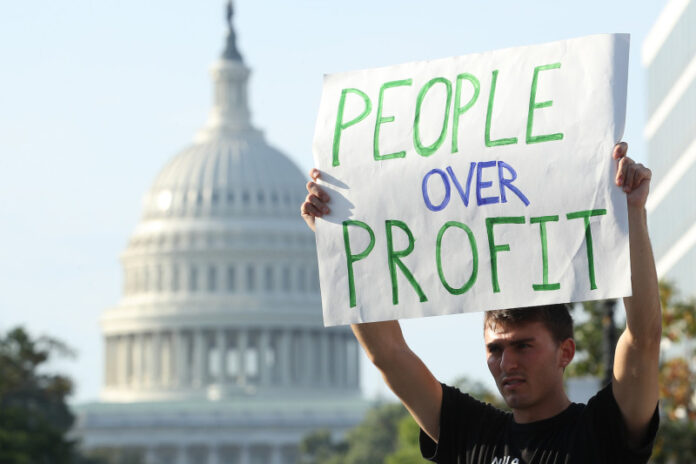Can market forces defeat global warming? Is the term greenwashing one that is familiar to you? Without government regulation can we keep the thermostat from climbing above 2.0 Celsius (3.6 Fahrenheit)?
A former chief investment officer for BlackRock believes the market is not set up to go it alone in halting global warming. He is Tariq Fancy, who from 2018 to 2019 was responsible for assessing sustainable investments for the $7 trillion US assets managed by his company. In fact, he concludes that the purpose of the funds managed by BlackRock is antithetical to the notion of pursuing sustainable, environmentally responsible investment. BlackRock makes profits for its investors. It is not out to correct the evils of environmental negligence as practiced by businesses in which it holds assets.
In a recent letter published by Larry Fink, Chairman, and CEO of BlackRock, he describes the investment fund’s commitment to net-zero greenhouse gas emissions by 2050 or sooner, describing the steps being taken this year and beyond to meet that goal including tracking the companies whose assets they hold and their trajectories to achieve net-zero and helping clients of BlackRock by providing them with better tools to scrutinize portfolios and expose where there is future climate risk. Companies under-investment are being asked to disclose their business plans aligned with the goal of keeping atmospheric warming below 2 Celsius by century end.
In an article written by Dominic Rushe and published in the Guardian last March, he quotes Tariq Fancy who has an interesting perspective on the challenges that BlackRock’s commitment raises. Fancy states:
“In many cases, it’s cheaper and easier to market yourself as green rather than do the long tail work of actually improving your sustainability profile. That’s expensive and if there is no penalty from the government, in the form of a carbon tax or anything else, then this market failure is going to persist.”
Fancy believes that money in sustainable investments may have no impact on climate change and that polluters may very well be let off the hook through “greenwashing.”
Today the efforts of a large number of businesses including BlackRock to embrace environmental sustainability can be equated with greenwashing, as in trying to pull the wool over the eyes of the public or causing misdirection through false messaging.
Fancy continues, “I don’t think the public realizes we are not talking about stopping climate change…We are literally talking about selling assets so we don’t get caught up in the damage when it hits.” Fancy notes that this orientation is a natural dilemma of investment companies “not because they are evil, it’s because the system is built to extract profits.” The buying and selling of assets don’t address the type of timeline associated with the problem of climate change. While the former activity is short-term, the latter requires decades of focus, and according to a 2019 Morgan Stanley study, some $50 trillion US to get the world economy to net zero. The consequences of our delayed actions here in the present have implications on the planet for millennia. That’s why relying on a free market solution led by a company holding corporate assets like BlackRock seems problematic if not downright stupid.
The problem of greenwashing is how it confuses the conversation creating the impression that “environmentally friendly advertising” equates with actual progress in addressing climate change and sustainability. Two good examples follow of greenwashing misdirection brought to you by the fossil fuel and automotive industries.
- Fossil fuel companies appear to be the best at doing this. Many advertise green initiatives such as investments in solar and wind farms even though they represent a tiny fraction of the business. Notably, BP, Chevron, Shell, and ExxonMobil come to mind.
- The automotive industry makes most of its profits from selling vehicles with internal combustion engines (ICE) while marketing their electric vehicle vision of the future even though they anticipate the bulk of their sales will come from the greenhouse-gas producing former than the latter.
Governments greenwash as well. The province of Alberta, Canada, instead of measuring the greenhouse gas emissions coming from its heavy oil operations, the oil sands, chooses to measure declines in carbon intensity from each barrel of synthetic crude. It never describes how growing volumes of barrels negatively offset any per barrel carbon reductions. What utter hogwash.
Fancy believes the only market force that can really impact climate change is putting a tax on carbon. He notes with such a tax, “every single portfolio manager would adjust their portfolio.” Interestingly Fancy is no longer in the investment portfolio business. Today he is running a Toronto-based non-profit, Rumie, focused on empowering online learning. He is far removed from his days at BlackRock.
As for the final question asked at the beginning of this posting, based on the current lack of action it is highly unlikely that the collective efforts of all nations will fall well short of the goal of limiting atmospheric heating to no more than 2.0 Celsius (3.6 Fahrenheit).
In a posting earlier this month, I described an Australian study looking at the face of climate change on that continent. It described a world 3 Celsius warmer in the next century. It was not pretty. With the current greenwashing and lack of commitment to real action to mitigate climate change, the Australian study could become a reality. It is not a scenario we would wish on those who follow us.
So BlackRock in its call to companies to commit to sustainability practices and net-zero will need to do even more than expose their climate risk to investors. BlackRock needs to become a proponent of using the market to put a price on carbon whether called a levy or tax or calling for a global cap and trade scheme to drive us to net-zero while making money for investors.
On a final note, in Canada last week, provincial governments who objected to the imposition of carbon pricing by the federal government, had their day in the Supreme Court and lost. Carbon pricing is now in place in my country and I hope it soon will be adopted globally. Without it, I’m not sure humanity can stop global warming this century and beyond.
















